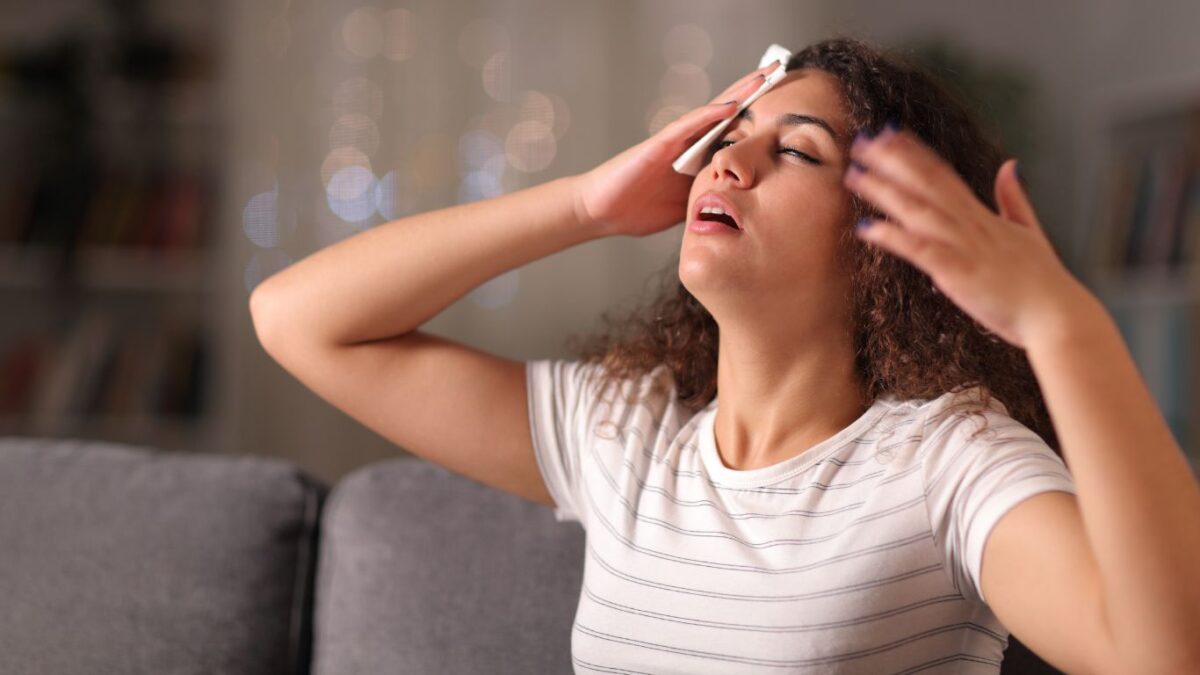Nighttime Nirvana: Tips to Beat Menopausal Night Sweats

Night Sweats and Menopause: Navigating the Midnight Heat Wave
In the quiet hours of the night, many women find themselves jolted awake, sheets drenched and a heat wave coursing through their bodies. This isn’t the aftermath of a forgotten thermostat setting or a summer night’s humidity. It’s a more personal kind of heat, one that’s intimately tied to a natural phase of life: menopause. Night sweats, one of the hallmark symptoms of menopause, can be both baffling and frustrating. Let’s delve into this nocturnal nuisance and explore ways to find relief.
Understanding the Midnight Surge
Menopause, often dubbed the “change of life,” is a significant milestone in a woman’s life, marking the end of her reproductive years. As the ovaries reduce their production of estrogen and progesterone, a cascade of physiological changes ensues. One of the most notable? The infamous hot flashes, which don’t discriminate between day and night.
Night sweats are essentially hot flashes that occur during sleep. The sudden drop in estrogen confuses the hypothalamus—the brain’s thermostat. Mistakenly believing the body is overheating, it triggers a rapid cooling process: dilated blood vessels, increased heart rate, and, of course, sweating.
The Ripple Effect of Night Sweats
When the serenity of sleep is repeatedly interrupted by night sweats, the consequences extend far beyond the immediate discomfort of damp sheets and pajamas. These nocturnal disruptions, often dismissed as mere inconveniences, can have profound implications for one’s overall well-being. Chronic sleep disruption can lead to a host of issues:
Cognitive Impact: The Brain’s Cry for Restful Sleep
Sleep isn’t just a passive state of rest; it’s an active process during which the brain undergoes essential maintenance. One of its primary roles is in memory consolidation, where the brain processes and stores new information from the day.
When night sweats disrupt this process, the aftermath isn’t just a groggy morning. Over time, these interruptions can manifest as:
- Daytime Brain Fog: A clouded mental state where concentration becomes elusive, and decision-making feels laborious.
- Reduced Sharpness: Tasks that once felt routine might take longer, and there’s a noticeable dip in reaction times and problem-solving abilities.
- Memory Lapses: Forgetfulness becomes more frequent, from misplacing keys to struggling to recall names or important dates.
Emotional Toll: The Delicate Balance of Mood and Sleep
Sleep and emotional well-being are deeply intertwined. A restful night acts as an emotional reset, allowing individuals to approach a new day with a balanced mindset.
However, when sleep is persistently disrupted:
- Mood Swings: Emotions can become a roller coaster, with heightened feelings of sadness, happiness, or anger without apparent triggers.
- Irritability: Patience wears thin, leading to short tempers and increased frustration over minor inconveniences.
- Depression: Chronic sleep disturbances can exacerbate feelings of hopelessness and sadness, potentially leading to clinical depression. It’s crucial to seek professional help if these feelings persist.
Physical Health: The Silent and Cumulative Effects of Sleep Deprivation
The body uses sleep as a time for repair and rejuvenation. When this process is interrupted:
- Obesity: Sleep deprivation can lead to hormonal imbalances that increase hunger and appetite, potentially leading to weight gain.
- Diabetes: Chronic lack of sleep has been linked to reduced insulin sensitivity, increasing the risk of type 2 diabetes.
- Cardiovascular Diseases: Sleep disturbances can elevate stress hormones and blood pressure, both risk factors for heart diseases.
Finding Relief from the Heat
While night sweats might seem like an inevitable part of menopause, there are strategies to mitigate their impact:
- Lifestyle Adjustments: Simple changes can make a difference. Consider lightweight, breathable sleepwear, and keep your bedroom cool. Limiting caffeine, alcohol, and spicy foods—especially in the evening—can also help.
- Mind-Body Techniques: Practices like deep breathing exercises, meditation, and yoga can reduce the frequency and severity of hot flashes and night sweats.
- Hormone Replacement Therapy (HRT): For some women, HRT can be a game-changer. It involves taking synthetic hormones to replace those the body no longer produces. However, it’s essential to discuss the benefits and risks with a healthcare professional.
- Alternative Therapies: Some women find relief with natural remedies like black cohosh, soy, and flaxseed. Acupuncture has also shown promise in reducing menopausal symptoms.
Night sweats, while a common symptom of menopause, don’t have to define this phase of life. With informed choices and proactive measures, it’s entirely possible to navigate this midnight heat wave and find cooler, more restful nights ahead. As with any health concern, it’s crucial to consult with a healthcare provider to tailor a strategy that’s right for you.